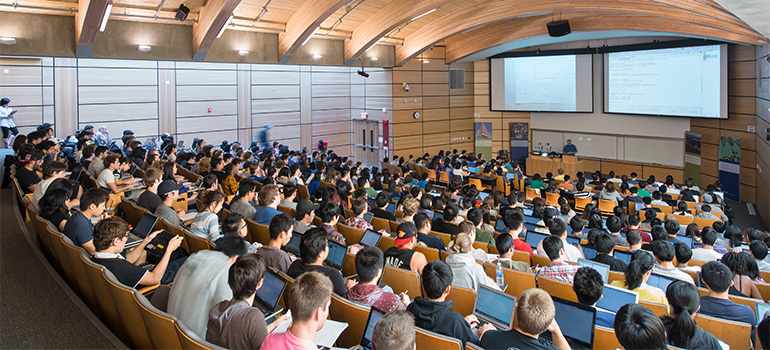UBC instructor offers advice for success in the classroom
As a senior instructor in UBC’s Dept. of Psychology, Sunaina Assanand has logged countless hours in classrooms. Lecturing to an average class size of 200 to 250 students, she’s also seen her fair share of classroom antics.
To better help first-year university students achieve success, Assanand, now an associate dean in the Faculty of Arts, shares her top five dos and don’ts for inside the lecture hall.
Top 5 Don’ts:
Don’t sleep
Particularly if you’re in the first few rows of the classroom. You’re in clear view of the instructor who is typically working very hard to try and keep students engaged. The point of attending class is completely lost.
If you miss class, don’t ask “Did I miss anything important?”
I know no instructor who would stand in front of a group of students for 50 to 80 minutes and do anything that wasn’t important. It is best to assume that everything is important.
Don’t surf the Internet
I’ve been astounded by the number of students who surf the web during class. Research suggests that students who are in adjacent seats are more adversely impacted by these online distractions than the student who is on the Internet.
Don’t listen to music
It’s only happened once, but I’ve had a student listen to music aloud during class. Although I didn’t hear the music, several students complained to me about this student’s disregard for their learning during class.
Don’t make out
It hasn’t happened to me, but it’s happened to a colleague. She was teaching a unit on romantic attraction and used the students as an example. The students’ conduct speaks to the range of inappropriate behaviour that occurs in the classroom.
Top 5 Dos:
Meet with your professor
Visit your professors during their office hours. Stay and talk to them after class. There is so much to be gained from informal conversations with your professors. The information that students can gain through these conversations is substantial. It makes our jobs meaningful to be able to interact with our students.
Ask for help
Don’t be scared to say ‘I don’t know’ or ‘I don’t understand.’ The role of a student is to ask for help in order to learn.
Study hard
I recognize that this appears self-evident, but often when students come to speak to me about how to study, they’re looking for shortcuts. There are no shortcuts to academic success. You have to work consistently, with initiative and motivation.
Ask tough questions
Don’t be afraid to ask controversial questions in the classroom, provided that you do so respectfully and sensitively. Controversy in the classroom fosters interest, learning, and growth among students.
Never stop wondering
Grading practices cause many students to lose their sense of wonder. However, if students recognize the purpose of a university education—to expand the mind—they will continue to wonder. As both a student and educator, my sense of wonder has maintained my love of learning.


